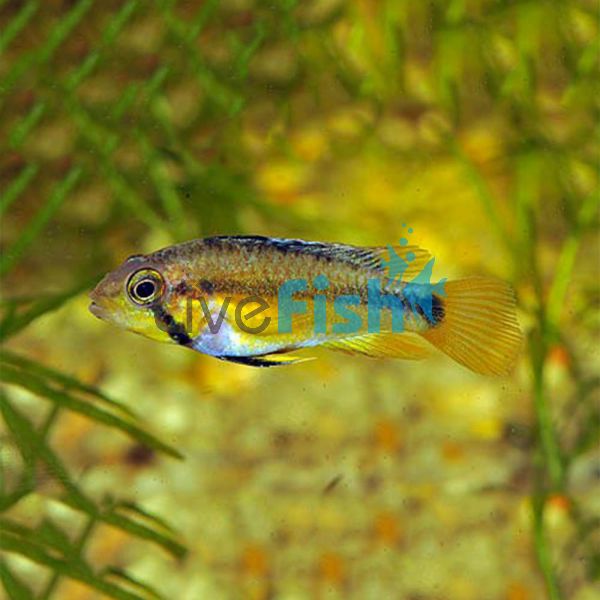Apisto Atahualpa - Wild Caught 3.5cm
The Apistogramma Atahualpa is a true collector species amongst the dwarf cichlids, its rare availability and unique wild colours make it a truly beautiful fish in a species only nano aquarium or in a South American themed community setting.
The Atahualpa is a lot more discreet in colors when compared to other Apistogramma, it has a very mild yellow base colour and highlights of bronze on the scales. The addition of a pure white underbelly and black bar running from eye to tail along with the arrowhead look of this bar on their face is truly unique to this fish. These fish are naturally like this and unlike certain Apistogramma colour morphs they have not been selectively bred out for their colours, this also means the Apistogramma Atahualpa has great genetics and hardy nature. They are a great fish to try out for aquarists looking to try something new in the dwarf cichlid world and are a fantastic alternative to some of the more sensitized dwarf cichlids like blue rams. Apistogramma Atahualpa would be a great long-term addition to a display community aquarium or a South American biotope and would be a real eye-catcher to look at.
Apistogramma Atahualpa
The Apistogramma Atahualpa is a true collector species amongst the dwarf cichlids, its rare availability and unique wild colours make it a truly beautiful fish in a species only nano aquarium or in a South American themed community setting.
The Atahualpa is a lot more discreet in colors when compared to other Apistogramma, it has a very mild yellow base colour and highlights of bronze on the scales. The addition of a pure white underbelly and black bar running from eye to tail along with the arrowhead look of this bar on their face is truly unique to this fish. These fish are naturally like this and unlike certain Apistogramma colour morphs they have not been selectively bred out for their colours, this also means the Apistogramma Atahualpa has great genetics and hardy nature. They are a great fish to try out for aquarists looking to try something new in the dwarf cichlid world and are a fantastic alternative to some of the more sensitized dwarf cichlids like blue rams. Apistogramma Atahualpa would be a great long-term addition to a display community aquarium or a South American biotope and would be a real eye-catcher to look at.
Trying to find the males and females in this species is possible were adult males bolder colours and more pointed dorsal and ventral fins whereas females have a paler body and rounded fins. This dwarf cichlid would do best with other small community fish such as gouramis, tetras, and Corydoras. naturally, the wild Apistogramma Atahualpa habitat is the river tributaries of South America.
Tank Recommendations for your Apistogramma Atahualpa
The Apistogramma Atahualpa only needs a tank of around 75 liters as they are a small growing fish. This makes them great for smaller community aquariums or to just show off a breeding pair of Atahualpa. A sand substrate is advisable as these cichlids actively will sift through the sand looking for food. They will also appreciate hiding areas around small pieces of driftwood, rock caves and they will love a densely planted aquarium as well which can really assist when looking to breed these fish, This species is most active during the day when the lights are on.
Suitable Tank Buddies
The Apistogramma Atahualpa is quite peaceful with mild aggression only ever coming out during breeding. With adequate space, these fish will get along with a wide range of community fish.
Usually Compatible
Tetras, gouramis, corydoras, angelfish, cherry barbs, and common community fish species.
Sometime Compatible
Other Apistogramma species and dwarf cichlids such as rams and large peaceful cichlids such as uaru or Severums might outcompete for food.
Rarely Compatible
Shrimp and large aggressive species such as African cichlids, Oscars, and Jaguar cichlids.
Feeding your Apistogramma Atahualpa
Apistogramma will easily consume aquarium foods and have a voracious appetite. Naturally, they are carnivores and they will readily prefer meaty foods. They will consume a wide range of dry and frozen foods. Their diet should contain good quality sinking pellets or flake and be supplemented with frozen food that has high protein such as bloodworm, brine shrimp, and daphnia. Feeding should occur once a day and it is best to do so when the lights are on during the day.
| Scientific Name | Apistogramma atahualpa |
|---|---|
| Care Level | Moderate |
| Common Names | Apistogramma atahualpa |
| Diet | Carnivore |
| Fish Family | Cichlidae |
| Lifespan (years) | 10 |
| Max. Length (cm) | 7 |
| Min. Tank Volume (l) | 75 Litres |
| Origin | South America |
| Reef Safe | Yes |
| Sociability | Peaceful |
| Venomous | No |
| Water Conditions | 24-26° C (75-79° F), pH 5.0-7.0 |




